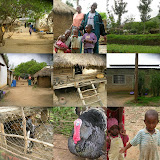After lunch, we say goodbye at the school and start our next drive, halfway back down and around the other side of the mountain to where Jackson lives, to Jackson’s compound, what seems to me a piece of land that showcases a local and evolving Kenyan success. In rural Kenya, it is not the size of the plot—land is everywhere—but rather what you are able to do with it. Jackson's is a wonderful place, built like steps into the mountain. The same piece of land where he was raised and where he planned to leave until his mother, in her last months, had a dream and advised him to stay.
Jackson’s driveway operates like a Main Street for his own small town. On one side of the dirt drive there is: a hut for laundry and cooking, another for storage and a cement house where Jackson lives with his wife Elizabeth and his three children. On the other side there are wonderful trees I cannot name, a tea-and-conversation-veranda of sorts, another mud-and-stick hut for visitors, a regal-looking turkey, a house for his goats and a coup for his chicken. Main Street is stopped at a dead-end by a cement two-bedroom house, where Jackson’s brother lives.
One step down the mountain are rows of Jackson’s crops (he is studying with a famous Kenyan botanist), both a garden for Elizabeth’s kitchen and herbs for his clinic. One step down from the crops is a half-built, five-room house constructed of homemade bricks and when we arrive the construction crew—a teenage mason and two seventy year-old old women—are packing up for the day. This is where Jackson, after graduating Divinity school in December, will move his family.
There is no time to rest so we do not rest. Jackson wants to hike and we do, a couple of miles back up the mountain, to see a house he is building for a recent widow gone homeless, also a plot of land he has purchased and may turn into a eco-friendly campground and cultural learning center. The view is for miles and the sun goes down. I learn that Safari Ants, a trail of which I almost step in, can gnaw through a human arm, if they are left undisturbed and given enough time. I learn that enough time is about one week.

We return to the compound at sundown, gather in Jackson’s home for dinner. While we wait for dinner, more of the obvious dawning on me, this time—no electricity, no running water. Paraffin lamps are lit. Tea is served out of the Thermos that is absolutely ubiquitous in Kenya. It is 7 or 8 PM, perfectly dark, and I have much assimilating to do. Jackson and Jane work at their cell phones, text messages and emails and returning of messages. I go to bed marveling at the challenges: how short the day that ends at 7, how hard it is to go from one place to another. I go to sleep fatigued by Jackson’s ambition, baffled and impressed into a genuine state of wonder about the ways in which this country moves...
See all of the Photos
See all of the Photos








No comments:
Post a Comment